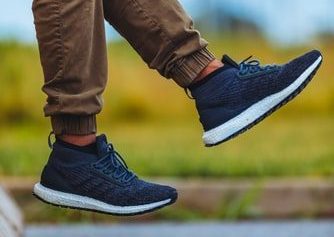
You know that varicose veins are the dark, bulging, rope-like cords underneath your skin, and you know that your vein health is important. But did you know that the shoes you wear every day play a substantial role in encouraging proper circulation? Find out what standards your shoes should meet, and learn about the different types of vein-friendly footwear.
Not all shoes are created equal. If you have vein insufficiency, restrictive shoes make it feel worse. Restrictive shoes can be a large cause of poor circulation in your legs and feet, and they can be a factor in developing venous diseases or varicose veins. They can also lead to a variety of other feet issues, including pain, blisters, and bunions. Since problems that occur in the lower legs and feet can ultimately influence how blood flows in the body, it’s important that you take the time to research the best shoes.
Make sure that the shoes you choose to wear provide you with enough arch support. This helps distribute pressure throughout your foot, lessens foot pain, provides balance and stability, and improves your posture.
An insole that’s specifically catered to your arch and your foot gives you extra cushion and will assist your arch when it flexes, thus placing less pressure and stress on your legs. Weight will be more evenly distributed when you walk or run, reducing the chance that you’ll overuse muscles or place weight incorrectly. If you have quality shoes that you enjoy but lack support, you don’t have to buy completely new shoes! Purchase orthotic insoles to increase the support and improve the fit.
Studies have shown that high heels can impede muscle pump function, and they can also raise venous pressure in the lower legs. High heels interfere with our natural walking process and because of that, they cause blood to pool in the leg. When you wear shoes with a low heel, you tone and strengthen your calf muscles. According to the National Heart, Lung, and Blood Institute, toned muscles improve blood flow back up through your legs. Save high heels for special occasions, and when you do have to wear them, limit it to short periods of time. Always pack a change of flats or low-heeled shoes.
Don’t make a habit of wearing stiff, uncomfortable shoes that don’t move with your feet like high heels, wedges, and men’s dress shoes. When shopping for shoes, take time to walk around the store and test how comfortably they fit! With every step, the shoe should contour to your foot.
When looking for the best type of shoes for varicose veins, you want to prioritize support and comfort. You will also typically want a shoe with a low heel as well.
Some of the best shoes for varicose veins and leg circulation are:
Managing Varicose Veins – Sleep, Walking, Footwear, Pregnancy, More
Risk Factors, Complications, Warning Signs
Symptoms – Bleeding, Itching, Skin Issues, Bulging, Clots & Ulcers
Varicose Vein Treatment
While choosing vein-friendly footwear is an excellent step toward investing in your vein health or managing everyday pain, it won’t eliminate already existing varicose veins. We take the time to address your concerns and evaluate your vein health so you know what treatment is best for you. If you have varicose veins or questions about your vein health, call the vein specialists in Kissimmee at Central Florida Vein & Vascular Center. Schedule a consultation by calling 407-545-3385 or 352-658-5547 today or filling out a contact form today.